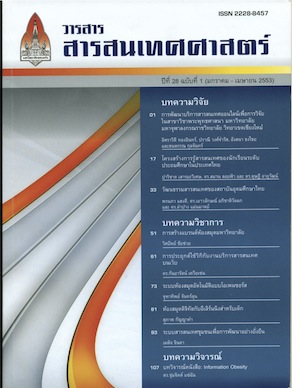วัฒนธรรมสารสนเทศของสถาบันอุดมศึกษาไทย
Keywords:
วัฒนธรรมสารสนเทศ, สถาบันอุดมศึกษา, การจัดการสารสนเทศ, การใช้สารสนเทศ, information culture, higher educational institutes, information management, information useAbstract
บทคัดย่อ
วัฒนธรรมสารสนเทศ หมายถึงระบบความคิดและความหมายร่วมกันของสารสนเทศซึ่งคนในองค์กรยอมรับและยึดถือร่วมกันโดยครอบคลุมการนิยามความหมายและการให้ความสำาคัญ ค่านิยม และบรรทัดฐานเกี่ยวกับสารสนเทศ ที่มีการยึดถือเป็นแนวทางในการประพฤติปฏิบัติซึ่งสะท้อนออกมาในรูปของพฤติกรรมที่เกี่ยวข้องกับการจัดการสารสนเทศ การใช้สารสนเทศ และการวัดผลงานด้านสารสนเทศ บทความนี้มีวัตถุประสงค์เพื่อนำาเสนอผลการศึกษาวัฒนธรรมสารสนเทศของสถาบันอุดมศึกษา ระเบียบวิธีวิจัยเป็นการวิจัยเชิงสำารวจ มีการเก็บข้อมูลเชิงปริมาณโดยใช้แบบสอบถาม กลุ่มตัวอย่างที่ใช้ในการศึกษาเป็นผู้บริหารระดับกลางสถาบันอุดมศึกษาของรัฐ จำานวน 91 คน บุคลากรสถาบันอุดมศึกษาสายผู้สอน จำานวน 276 คน และบุคลากรสายสนับสนุน จำนวน 296 คน จากมหาวิทยาลัยของรัฐ 8 แห่ง วิเคราะห์ข้อมูลโดยใช้ความถี่ ร้อยละ ค่าเฉลี่ย และค่าเบี่ยงเบนมาตรฐาน บทความนี้นำาเสนอวัฒนธรรมสารสนเทศจำาแนกตามกลุ่มมหาวิทยาลัย ประกอบด้วย กลุ่มมหาวิทยาลัยเก่าแก่ มหาวิทยาลัยกลุ่มกลาง และกลุ่มมหาวิทยาลัยใหม่
ผลการศึกษาพบว่า กลุ่มมหาวิทยาลัยใหม่มีวัฒนธรรมสารสนเทศสูงกว่ากลุ่มมหาวิทยาลัยเก่าแก่ และมหาวิทยาลัยกลุ่มกลาง
คำสำคัญ: วัฒนธรรมสารสนเทศ; สถาบันอุดมศึกษา; การจัดการสารสนเทศ; การใช้สารสนเทศ
Abstract
Information culture is defined as a system of shared meaning and perception of information thatis recognized and held on to people in organizations. These cover values and norms that are enactedthrough behavior concerning information use, information management and measurement of performance.This paper has its aims to present the findings of the study that identify the information culture in highereducational institutes. Quantitative research method was used in this study. The data were collectedthrough mail-questionnaires from 91 administrative staff, 276 faculties, and 296 supporting personnel in 8universities. The data were analyzed using the statistical methods including frequency, percentage, meanand standard deviation. The study identifies information culture as composed of values, norms, informationuse behavior, information management and measurement of performance concerning information. This paperdescribes the nature of information culture in three types of universities, the early established universities ofover 40 years of age, the medium-size universities of 21-40 year establishment, and the new universities.A significant finding is that the personnel of the new universities show higher level of information culturethan those in the early established universities of over 40 years of age and the medium-size universitiesof 21-40 year establishment.
Keywords: information culture; higher educational institutes; information management; information use








